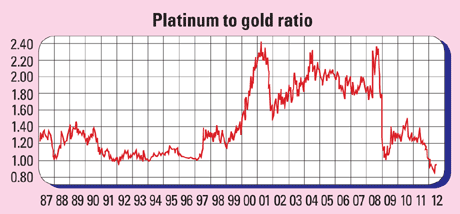How to play the price of platinum
Platinum, rarer than gold and traditionally more expensive, is now trading at a discount to the price of gold. So is it a good time to buy? Phil Oakley picks some of the best ways to invest in platinum.
Get the latest financial news, insights and expert analysis from our award-winning MoneyWeek team, to help you understand what really matters when it comes to your finances.
You are now subscribed
Your newsletter sign-up was successful
Want to add more newsletters?

Twice daily
MoneyWeek
Get the latest financial news, insights and expert analysis from our award-winning MoneyWeek team, to help you understand what really matters when it comes to your finances.

Four times a week
Look After My Bills
Sign up to our free money-saving newsletter, filled with the latest news and expert advice to help you find the best tips and deals for managing your bills. Start saving today!
As regular readers will know, we're fans of gold here at MoneyWeek; but could platinum be a better bet in 2012? Look at the chart below. It shows the ratio of the price of platinum compared to the price of gold (both in ounces). When the ratio is above one, platinum is more expensive than gold, which is typically the case because platinum is the rarer metal.
However, that relationship has broken down recently. Platinum is now trading at a discount to gold indeed, it hasn't been this cheap relative to gold for around 26 years. So is now a good time to buy?
As with most things, the price of platinum is determined by demand and supply. On the demand side, the main use of platinum is for catalytic converters in engines, so a lot depends on the health of the car market.
MoneyWeek
Subscribe to MoneyWeek today and get your first six magazine issues absolutely FREE

Sign up to Money Morning
Don't miss the latest investment and personal finances news, market analysis, plus money-saving tips with our free twice-daily newsletter
Don't miss the latest investment and personal finances news, market analysis, plus money-saving tips with our free twice-daily newsletter
Research group IHS Automotive expects global light vehicle sales to rise 4% to 78 million in 2012, but notes that a deepening crisis in the eurozone could have a negative impact.
But at the same time, with emissions standards tightening, there seems to be some demand support for platinum. On the supply side, the price of platinum is now at, or below, the cost of production. That means miners have little incentive to produce more. This could hit supply, pushing the price higher.
That sounds like a pretty bullish picture to us. If you agree, the easiest way to get exposure to platinum is via an exchange-traded fund, such as ETFS Physical Platinum (LSE: PHPT).
A more geared play would be through shares in a platinum miner, such as Anglo American (LSE:AAL) or Lonmin (LSE: LMI), or Johnson Matthey (LSE: JMAT), the top distributor of platinum group metals.
Of course, there's a further way for the platinum/gold ratio to revert to normal' levels. If there's another big market panic, we could see a 2008-style sell-off in precious metals.

Theoretically, the gold price could fall faster than that of platinum. The ratio would rise, but an investor in platinum would still lose money.
We are still bullish on gold, so this concerns us less in the long run, but if you are comfortable with spread betting, you could try a pairs trade', whereby you sell gold and buy platinum in proportion to one another. This way, it doesn't matter what happens to the individual metal prices, you make money as long as the gap between the two shrinks (ie, the ratio rises) and lose it if the gap widens (ie, the ratio falls).
This article was originally published in MoneyWeek magazine issue number 573 on 27 January 2011, and was available exclusively to magazine subscribers. To read all our subscriber-only articles right away, subscribe to MoneyWeek magazine.
Get the latest financial news, insights and expert analysis from our award-winning MoneyWeek team, to help you understand what really matters when it comes to your finances.
Phil spent 13 years as an investment analyst for both stockbroking and fund management companies.
-
 Early signs of the AI apocalypse?
Early signs of the AI apocalypse?Uncertainty is rife as investors question what the impact of AI will be.
-
 Reach for the stars to boost Britain's space industry
Reach for the stars to boost Britain's space industryopinion We can’t afford to neglect Britain's space industry. Unfortunately, the government is taking completely the wrong approach, says Matthew Lynn